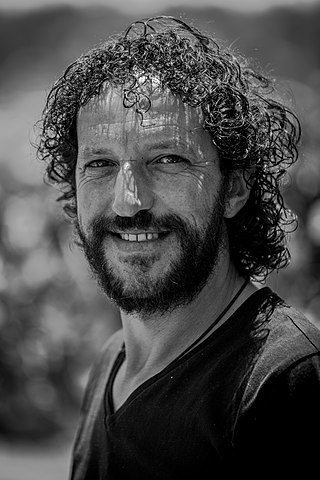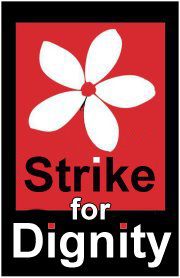Civil disobedience is the active, professed refusal of a citizen to obey certain laws, demands, orders or commands of a government. By some definitions, civil disobedience has to be nonviolent to be called "civil". Hence, civil disobedience is sometimes equated with peaceful protests or nonviolent resistance.
Anarchism and violence have been linked together by events in anarchist history such as violent revolution, terrorism, assassination attempts and propaganda of the deed. Propaganda of the deed, or attentát, was espoused by leading anarchists in the late 19th century and was associated with a number of incidents of political violence. Anarchist thought, however, is quite diverse on the question of violence. Where some anarchists have opposed coercive means on the basis of coherence, others have supported acts of violent revolution as a path toward anarchy. Anarcho-pacifism is a school of thought within anarchism which rejects all violence.

Satyāgraha, or "holding firmly to truth", or "truth force", is a particular form of nonviolent resistance or civil resistance. Someone who practises satyagraha is a satyagrahi.

Nonviolence is the personal practice of not causing harm to others under any condition. It may come from the belief that hurting people, animals and/or the environment is unnecessary to achieve an outcome and it may refer to a general philosophy of abstention from violence. It may be based on moral, religious or spiritual principles, or the reasons for it may be strategic or pragmatic. Failure to distinguish between the two types of nonviolent approaches can lead to distortion in the concept's meaning and effectiveness, which can subsequently result in confusion among the audience. Although both principled and pragmatic nonviolent approaches preach for nonviolence, they may have distinct motives, goals, philosophies, and techniques. However, rather than debating the best practice between the two approaches, both can indicate alternative paths for those who do not want to use violence.
Anarcho-pacifism, also referred to as anarchist pacifism and pacifist anarchism, is an anarchist school of thought that advocates for the use of peaceful, non-violent forms of resistance in the struggle for social change. Anarcho-pacifism rejects the principle of violence which is seen as a form of power and therefore as contradictory to key anarchist ideals such as the rejection of hierarchy and dominance. Many anarcho-pacifists are also Christian anarchists, who reject war and the use of violence.

A protest is a public expression of objection, disapproval, or dissent towards an idea or action, typically a political one. Protests can be thought of as acts of cooperation in which numerous people cooperate by attending, and share the potential costs and risks of doing so. Protests can take many different forms, from individual statements to mass political demonstrations. Protesters may organize a protest as a way of publicly making their opinions heard in an attempt to influence public opinion or government policy, or they may undertake direct action in an attempt to enact desired changes themselves. When protests are part of a systematic and peaceful nonviolent campaign to achieve a particular objective, and involve the use of pressure as well as persuasion, they go beyond mere protest and may be better described as civil resistance or nonviolent resistance.

Civil rights movements are a worldwide series of political movements for equality before the law, that peaked in the 1960s. In many situations they have been characterized by nonviolent protests, or have taken the form of campaigns of civil resistance aimed at achieving change through nonviolent forms of resistance. In some situations, they have been accompanied, or followed, by civil unrest and armed rebellion. The process has been long and tenuous in many countries, and many of these movements did not, or have yet to, fully achieve their goals, although the efforts of these movements have led to improvements in the legal rights of some previously oppressed groups of people, in some places.
Peacemakers was an American pacifist organization founded following a conference on "More Disciplined and Revolutionary Pacifist Activity" in Chicago in July 1948. Ernest and Marion Bromley and Juanita and Wally Nelson largely organized the group. The name “Peacemakers” was taken from a section of the Bible, the Beatitudes or Sermon on the Mount: "Blessed are the peacemakers, for they will be called children of God." The group’s organizational structure adopted a multidivisional organizational structure with a loose hierarchy, prioritizing local committees including but not limited to the Tax Refusal and Military Draft Refusal Committee. The Peacemakers were social anarchists whose organizational beliefs are largely attributed to Marxist philosophy. Peacemakers aimed to advocate nonviolent resistance in the service of peace.
A nonviolent revolution is a revolution conducted primarily by unarmed civilians using tactics of civil resistance, including various forms of nonviolent protest, to bring about the departure of governments seen as entrenched and authoritarian without the use or threat of violence. While many campaigns of civil resistance are intended for much more limited goals than revolution, generally a nonviolent revolution is characterized by simultaneous advocacy of democracy, human rights, and national independence in the country concerned.

Nonviolent Peaceforce (NP) is an international nongovernmental organization that employs Unarmed Civilian Protection. Their mission is to protect civilians in violent conflicts through unarmed strategies, build peace side-by-side with local communities, and advocate for the wider adoption of these approaches to safeguard human lives and dignity. NP holds Special Consultative Status with the Economic and Social Council of the United Nations, and has been endorsed by nine Nobel Peace Prize laureates, including the Dalai Lama and former South African Archbishop Desmond Tutu. In 2016, Nonviolent Peaceforce was nominated for a Nobel Peace Prize.
Pietro Ameglio is a Uruguayan-born naturalized Mexican citizen and Gandhian civil rights and peace activist best known for his role in promoting nonviolence and creating a movement for peace and anti-militarism in Mexico.
Civil resistance is a form of political action that relies on the use of nonviolent resistance by ordinary people to challenge a particular power, force, policy or regime. Civil resistance operates through appeals to the adversary, pressure and coercion: it can involve systematic attempts to undermine or expose the adversary's sources of power. Forms of action have included demonstrations, vigils and petitions; strikes, go-slows, boycotts and emigration movements; and sit-ins, occupations, constructive program, and the creation of parallel institutions of government.

"People Power" is a political term denoting the populist driving force of any social movement which invokes the authority of grassroots opinion and willpower, usually in opposition to that of conventionally organised corporate or political forces. People power protest attempts to make changes in the political process of a given state - it refers to “revolutions driven by civil society mobilisation” which result in a reconfiguration of political power in a given state. As denoted by the name, this method is reliant on popular participation “civilian-based” and therefore does not include isolated acts or protest without an overarching organisation by a group of people. People power can be manifested as a small-scale protest or campaign for neighborhood change; or as wide-ranging, revolutionary action involving national street demonstrations, work stoppages and general strikes intending to overthrow an existing government and/or political system. With regards to tactics employed by People Power movements, both nonviolence and violence have been used throughout history: as was the case in the non-violent 1986 Philippines revolution which overthrew the Marcos régime, or the violent uprising in Libya in 2011.

Nonviolent resistance, or nonviolent action, sometimes called civil resistance, is the practice of achieving goals such as social change through symbolic protests, civil disobedience, economic or political noncooperation, satyagraha, constructive program, or other methods, while refraining from violence and the threat of violence. This type of action highlights the desires of an individual or group that feels that something needs to change to improve the current condition of the resisting person or group.
Different Muslim movements through history had linked pacifism with Muslim theology. However, warfare has been an integral part of Islamic history both for the defense and the spread of the faith since the time of Muhammad.
The Local Coordination Committees of Syria are a network of local groups that organise and report on protests as part of the Syrian uprising. In June 2011, the network was described by The New York Times as beginning to "emerge as a pivotal force" in Syria. As of August 2011, the network supported civil disobedience and opposed local armed resistance and international military intervention as methods of opposing the Syrian government.

The Syrian Revolution Coordinators Union or (SYRCU) is an organization with members from different protest coordination groups from all around Syria. Its members represent their areas and cities for the activities of the Syrian uprising that began in 2011 against the Syrian government. The Syrian Revolution Coordinators Union has been active since the beginning of the revolution in peaceful resistance

Ali Abu Awwad is a prominent Palestinian peace activist and proponent of nonviolence. He is the founder of Taghyeer (Change), a Palestinian national movement promoting nonviolence to achieve and guarantee a nonviolent solution to the conflict. Awwad's story and efforts have been featured in over twelve documentaries including two award-winning films, Encounter Point and Forbidden Childhood. Furthermore, he was honored by the global nonprofit thinktank Synergos as the Arab World Social Innovator in Palestine for "introducing non-violence, reconciliation, and civic participation to Palestinians as a means of empowering citizens to seek social change and find a more equitable solution to conflict." Awwad is currently finishing his memoir called Painful Hope, an account of his experiences as well as his strategy and vision for the Palestinian future. He lives in Beit Ummar, near Hebron.

Strike for Dignity was a nationwide general strike organised by groups in the Syrian Civil War in December 2011 as a nonviolent expression of dissent against the government of Bashar al-Assad during the Syrian civil war. It is significant as one of the very few strikes during the four decades of Ba'ath Party rule in Syria.

Diversity of tactics is a phenomenon wherein a social movement makes periodic use of force for disruptive or defensive purposes, stepping beyond the limits of nonviolent resistance, but also stopping short of total militarization. It also refers to the theory which asserts this to be the most effective strategy of civil disobedience for social change. Diversity of tactics may promote nonviolent tactics, or armed resistance, or a range of methods in between, depending on the level of repression the political movement is facing. It sometimes claims to advocate for "forms of resistance that maximize respect for life".











